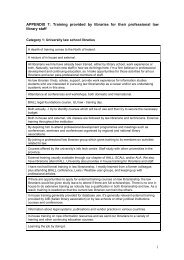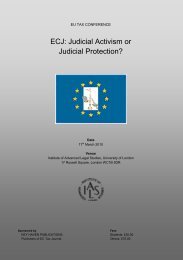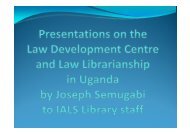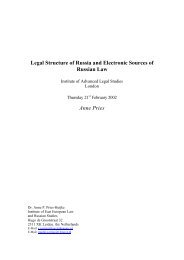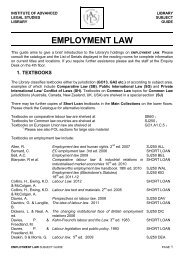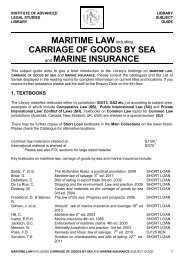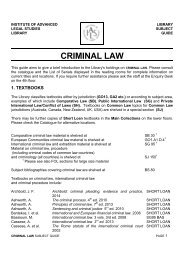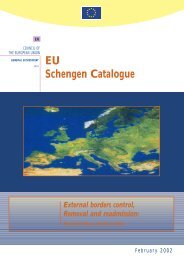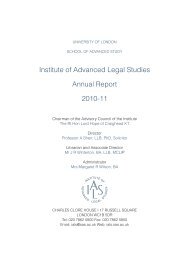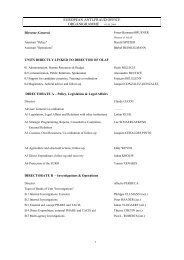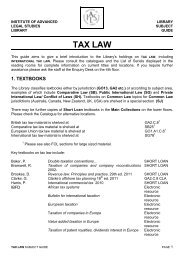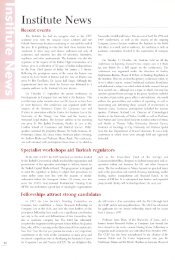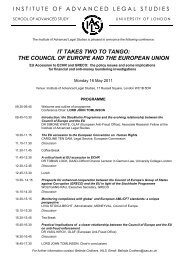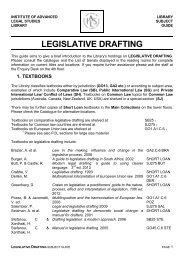a thesis - Institute of Advanced Legal Studies
a thesis - Institute of Advanced Legal Studies
a thesis - Institute of Advanced Legal Studies
You also want an ePaper? Increase the reach of your titles
YUMPU automatically turns print PDFs into web optimized ePapers that Google loves.
76 EXPRESS TRUSTS.<br />
husband. Mr. Justice Pearson refused to set the settlement aside,<br />
on the ground that the marriage was valid; the consideration was<br />
given, and could not be undone. And this decision was affirmed by<br />
the Court <strong>of</strong> Appeal. Johmton v. Johnston (1885), 52 L. T. 76.<br />
Fraud as a cause <strong>of</strong> invalidity <strong>of</strong> a trust is more important where<br />
it affects the purpose for which the trust is created. This will be<br />
dealt with later.<br />
UNDUE INFLUENCE.<br />
Closely connected with fraud is undue influence. "As no<br />
court has ever attempted to define fraud, so no court has ever<br />
attempted to define undue influence, which includes one <strong>of</strong> its<br />
many varieties," Lord Justice Lindley said in Allcard v. Skinner<br />
(1887, 36 Ch. D. at p. 183).<br />
Undue influence may be actual or presumed. Where a gift<br />
(which term is here used to include a benefit under a trust) is<br />
proved to have been obtained as a result <strong>of</strong> the exercise <strong>of</strong> undue<br />
influence, the donor can always recall it.<br />
Further, there are cases in which the relation between donor<br />
and donee, at or shortly before the making <strong>of</strong> the gift, is such as<br />
to raise a presumption <strong>of</strong> undue influence, and the court then sets<br />
aside the gift unless the donee can prove that it was the result <strong>of</strong> a<br />
free exercise <strong>of</strong> the donor's will. It is immaterial in such a case<br />
that the donor makes the gift without pressure or solicitation by<br />
the donee, or that the donor perfectly understands the nature <strong>of</strong><br />
what he is doing. In these cases the court interferes, not on<br />
the ground that any wrongful act has in fact been committed by<br />
the donee, but on the ground <strong>of</strong> public policy and to prevent an<br />
abuse <strong>of</strong> the relation which existed between the parties and <strong>of</strong> the<br />
influence which arises from it. The principle on which the law is<br />
based is that it is right and expedient to save people from being<br />
victimised by others. " To protect people from being forced,<br />
tricked, or misled in any way by others into parting with their<br />
property, is one <strong>of</strong> the most legitimate objects <strong>of</strong> all laws," as Lord<br />
Justice Lindley said. (See Ashburner on Equity, 412, and the<br />
judgment <strong>of</strong> Lindley, L. J., in Allcard v. Skinner, supra.}<br />
The principal relations which give rise to a presumption <strong>of</strong> undue<br />
influence are those <strong>of</strong> :—<br />
Parent and child and similar relations ( Wright v. Vanderplank<br />
(1856), 8 D. M. & G. 136; Powell v. Powell, (1900) 1 Ch. 243);



